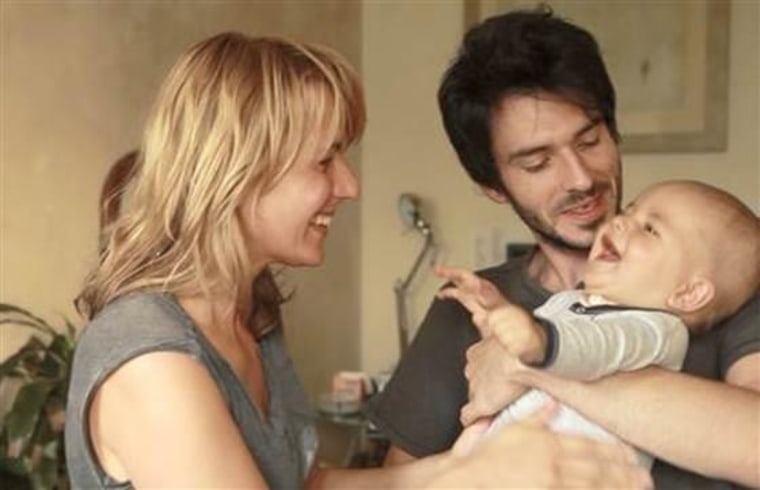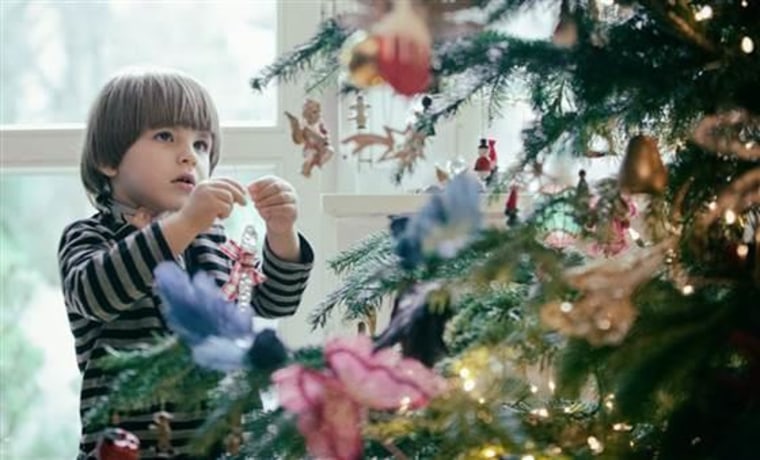Some of the worst news any new parents can receive is that their baby will face the challenge of a lifelong disability. It's the kind of thing that can make even the strongest moms and dads want to hide from the world while caring for their littlest one.

Not Polish film student Tomasz Śliwiński and his wife Magda Hueckel, though. When they discovered their boy Leo had been born with a rare condition called Ondine's Curse, which causes him to stop breathing when he sleeps (he has to wear a respirator every night), they turned to the camera for relief. And now, their 30-minute short film "Our Curse" has been nominated for an Academy Award.
"We really felt our life ended at that time," Śliwiński told TODAY.com about getting the diagnosis. "We thought we had to be locked at home with Leo, have no friends, so filming was therapy for us."
Ondine's Curse is named for a mythological water nymph who wed a mortal who was unfaithful; as punishment, the legend goes, the mortal was cursed so that if he ever fell asleep, he would stop breathing. The condition, more clinically called congenital central hypoventilation syndrome (CCHS), was named in 1970; the gene that causes it in 90 percent of the patients was isolated in 2002. It affects a few hundred people in the U.S.
"These babies are literally thinking to breathe," says Dr. Allen J. Dozor, professor of pediatrics and chief of pediatric pulmonology at Maria Fereri Children's Hospital in Westchester, New York; he treats 32 patients with CCHS. "You and I can keep our heart rate steady, our temperature steady — we breathe without thinking about it. Babies and then adults literally have to use the thinking part of their brain, higher functions, to remind them to breathe."
This works while the child is awake, but once asleep the patient requires lifelong respiratory assistance, either with a tracheostomy and ventilator (as shown in "Our Curse") or a mask; sometimes a diaphragm pacemaker is used. Regardless of the method, the patient must be monitored whenever he or she sleeps in case of mechanical failure, clogged tubes, or a slipped mask. Individuals do survive to adulthood, but they run the risk of mild to severe brain damage due to periods where they don't receive enough oxygen.
Yet "Our Curse" addresses larger issues than the reality of a medical diagnosis. In the movie, Śliwiński and Hueckel are brutally honest in scenes where they sit on their couch, clearly exhausted, and talk about their fears and feelings of guilt — emotions that echo for any parent who must help their child face daily life-and-death struggles.
Śliwiński wonders what Leo will think when he's old enough to understand his disability. "My biggest fear is that when he's more aware he'll just commit suicide," he says in the film.
"We didn’t put any censorship on ourselves, we said we could film anything and then decide in editing what to use," he says, noting that it was a mentor in his film school who suggested they share their feelings with the camera, even if they never did anything with the footage.
"But even in editing there wasn’t any censorship," he continued. "If we’re going to tell this story we want to be honest with the way it happened. I don’t feel any embarrassment; these are human emotions and these are things people really appreciate."
Being honest in front of the camera didn't set them free from those emotions, but later on was a different story. "Watching the film after editing it was liberating," he said. "Seeing the film over and over again, while we were editing it and then later, we got some distance from the story."
The movie is not easy to watch — there's a single shot where the parents swaddle up little Leo and have to change his tracheotomy tube themselves. Leo is wailing, but makes no sound, because at that time he was unable to make noise.
But just as it seems things will continue dark forever, Hueckel turns a corner, seemingly on camera. She blames herself for having "bad thoughts" during her pregnancy, and Śliwiński notes that Leo must seem like the realization of all those fears. She discovers that because she is facing all her fears now, she isn't afraid of them any more.
"Something like this is a huge test for any relationship," said Śliwiński, who has been married to Hueckel since 2004. "But straight from the beginning we united ourselves, we had a common enemy in the disease, so we weren’t fighting with each other. The worst thing is when the parents accuse each other, fight with each other rather than uniting against a common enemy. This really brought us together."
The film, plus a blog started a year after Leo's birth (www.leoblog.pl, which can be read in English) has not only been eye-opening for Leo's parents, but for many others.
WATCH: The full version of "Our Curse." Note: Some profanity.
"It was the most rewarding experience that people came to us during the screenings and thanked us for the movie," said Śliwiński. "People all over the world would say, 'It was like we were with you on that couch.' It’s a universal experience."
As for little Leo, he's four years old and is beginning to speak (since he couldn't make noise early on, he's a little developmentally delayed in that area). His parents aren't without worry, but as the end of the film shows, they've learned how to live with the daily demands of their delightful son. And one day, yes, his father would like him to see the movie — suicide line and all.
"He should see it, though it would not be easy for him," he said. "But you have to be honest in relationships. I had some doubts whether I should use [the comment about suicide] but I thought the only way to do this film is to be honest."

And, Śliwiński adds, he's got a different perspective now: For Leo, this won't be a disability. This is just how he will live in the world. "People who don’t have any disabilities will have a different perception," he said. "Children who are disabled from the beginning are on a different level — it’s an expression of my inner fears and how I’d respond to the situation, it’s not how Leo will. I’m sure he’ll be a strong guy."
Research continues into CCHS, and according to Dr. Dozor, there's a good chance that it is more widely spread than originally believed. While the most severe cases caught the medical community's attention initially, he says there is likely a link to some cases of (otherwise unexplained) Sudden Infant Death Syndrome (SIDS), because milder cases may not manifest at birth.
Leo's life today is not without challenges, but now his parents feel ready to help him with those struggles. That's why it makes so much sense to end the film the way it does: With the trio dancing together in their living room.
"It’s not that everything is happy and there’s no problem, it’s just the direction in which we’re heading," says Śliwiński. "We had a couch conversation and realized we were done. The therapy is over and we have to start living. It was natural we had to stop shooting this and start enjoying life as fully as we can. So the final scene has a double meaning — we're dancing to the song we danced to at our wedding ['Number Nine' by the Twilight Singers]. I wanted to dance it together with Leo."